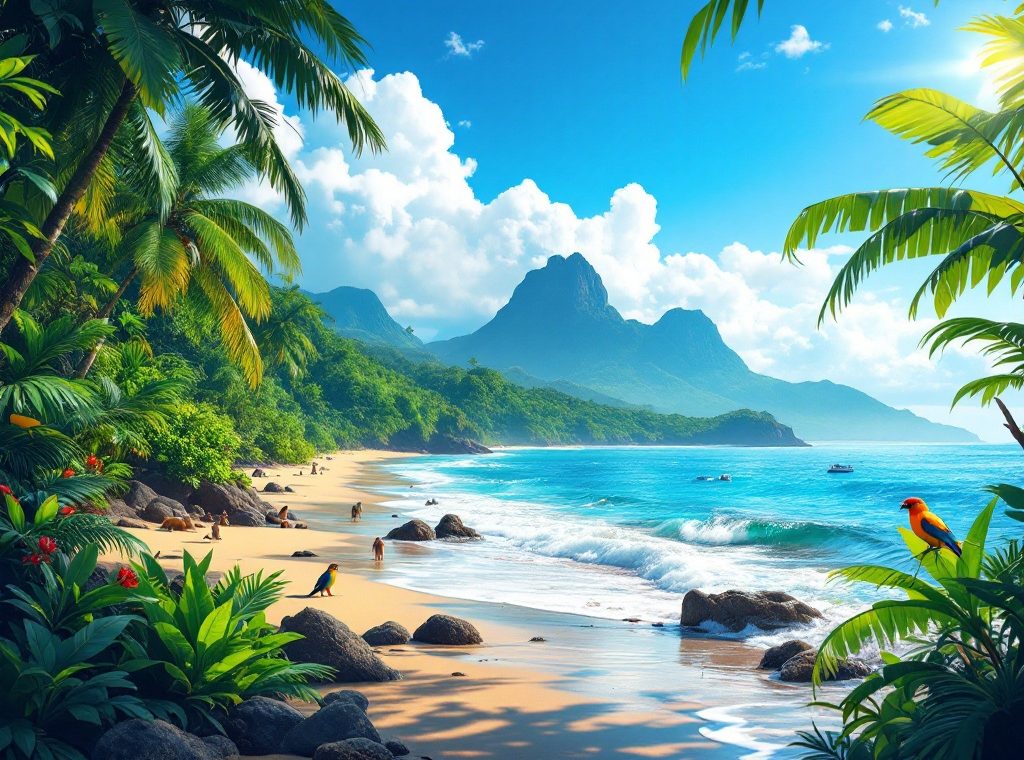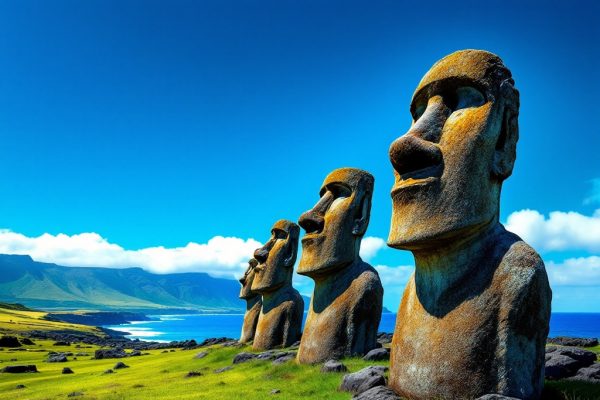Is It Safe to Travel to Costa Rica in 2025: Complete Guide
Dreaming of a Costa Rican getaway in 2025? Known for its peaceful atmosphere and stunning natural beauty, Costa Rica is a tempting destination. While generally safe, understanding potential risks, from petty theft to rip currents, is vital for a smooth trip. This guide provides essential safety advice, covering everything from visa requirements and health precautions to navigating local transportation and preparing for natural hazards. Discover how to maximize your enjoyment and peace of mind while exploring this vibrant country. Read on to plan your safest and most memorable Costa Rican adventure.
Important information

- Costa Rica is generally safe for tourists, but petty theft can happen. Be aware of your surroundings, especially in crowded places.
- Passports must be valid for six months beyond your return date. Many nationalities (including US and EU citizens) get 90 days visa-free.
- Travel insurance is recommended. Be aware of mosquito-borne illnesses (dengue, Zika, chikungunya) and take precautions like using repellent.
- Road conditions can be difficult. An International Driving Permit is needed for car rentals. Public transport and ride-sharing are good options.
- Be prepared for natural hazards (earthquakes, volcanoes, flooding). Check the National Emergency Commission (CNE) for alerts and heed ocean safety warnings.
Is Costa Rica Safe for Travelers in 2025?
Costa Rica remains a popular travel destination in 2025, known for its peaceful atmosphere. The country famously disbanded its army in 1949, further enhancing its tranquil reputation. While generally safe, petty theft can occur. Take precautions to ensure a secure and enjoyable visit. Be mindful of your surroundings and protect your valuables, especially in crowded areas.
Costa Rica’s Safety Reputation
Costa Rica is a safe tourist destination, with local communities prioritizing visitor safety. However, petty theft can occur, so it’s wise to remain vigilant and keep an eye on your belongings.
Global Peace Index and State Department Ratings
Costa Rica ranks 58th out of 163 countries on the Global Peace Index, indicating moderate peacefulness. However, the US State Department’s Level 2 travel advisory recommends increased vigilance and awareness of one’s surroundings.
Government and Community Safety Initiatives
Costa Rica prioritizes tourist safety through partnerships with local communities, fostering a secure environment for both residents and visitors. A visible tourist police presence in popular areas deters crime and provides assistance to travelers, enhancing the safety of the Costa Rican travel experience.
Entry and Visa Requirements for 2025
Ensure your passport’s validity extends six months beyond your planned return date for a hassle-free journey. Citizens of numerous countries, including the US and EU, enjoy visa-free entry for up to 90 days. This convenient arrangement applies to approximately 65 nationalities. However, be ready to present proof of onward travel and demonstrate adequate financial resources.
Passport Validity and Visa Requirements
Ensure your passport’s validity extends six months beyond your planned departure date. Citizens of around 65 countries, including those from the US and EU, can enter visa-free and stay for up to 90 days. However, be prepared to show proof of onward travel and sufficient funds, as border officials may ask for these documents.
Vaccination Requirements: Yellow Fever and Others
A yellow fever vaccination certificate is not required for entry into Costa Rica. However, if you are arriving from a country with a high risk of yellow fever, vaccination is recommended. This precaution protects your health and well-being.
Crime and Personal Security Considerations
Costa Rica is a popular tourist destination, but petty theft can be a concern. Stay vigilant in crowded areas, such as buses, beaches, and tourist hubs. Be cautious of scams, particularly those involving fake taxis or rental car damage schemes. Travel insurance is recommended to protect against financial losses from these incidents. For serious crimes, dial 911 and inform your embassy.
Petty Theft and Crime Hotspots
Petty theft, including pickpocketing and bag snatching, is a concern in Costa Rica, particularly in crowded areas like bus stations. Be vigilant and secure your belongings in these locations. The Coca-Cola District in San José is a known hotspot for such crimes, especially after dark, so tourists should exercise increased caution there. Here are some safety tips for your visit:
Be aware of your surroundings, especially in crowded areas like markets, bus stations, and tourist attractions. Pay attention to who is around you and avoid distractions like using your phone while walking.
Secure your valuables. Carry your bags close to your body and use a money belt or hidden pouch for important documents, cash, and credit cards. Avoid displaying expensive jewelry or electronics.
Be cautious of overly friendly strangers. Scammers sometimes use distractions or fake offers of help to steal from unsuspecting tourists.
Exercise extra caution at night, especially in less-populated areas. Stick to well-lit streets and consider traveling in groups when possible.
If you are confronted by a thief, do not resist. Your safety is more important than your belongings. Report the incident to the local police as soon as possible.
Personal Security Measures and Travel Insurance
Safeguard your valuables by using the hotel safe. Consider travel insurance for added peace of mind.
Health and Medical Safety in Costa Rica
Costa Rica offers good medical care. Public hospitals provide adequate services, and private clinics, especially in San José, offer excellent ones. However, travelers should be aware of mosquito-borne illnesses like dengue fever, Zika, and chikungunya. Travel health insurance, including medical evacuation coverage, is highly recommended. Pack sufficient prescription medications and confirm your insurance covers international emergencies. Preventative measures, such as vaccinations and insect repellent, are essential for a healthy trip and offer protection against these mosquito-borne diseases.
Tips for Staying Healthy in Costa Rica
- Be aware of mosquito-borne illnesses like dengue fever, Zika, and chikungunya.
- Pack sufficient prescription medications.
- Use insect repellent.
Recommended Precautions
- Get travel health insurance, including medical evacuation coverage.
- Confirm your insurance covers international emergencies.
- Consider necessary vaccinations.
Common Health Risks: Dengue, Zika, and More
Planning a trip to Costa Rica? Be aware of potential health risks, such as mosquito-borne illnesses like dengue, Zika, and chikungunya. Protect yourself by using insect repellent and mosquito nets. Safe drinking water is also crucial. Stick to bottled water or boil tap water before drinking it. These precautions will contribute to a healthier and more enjoyable trip.
Medical Services and Quality Healthcare Facilities
Costa Rica offers excellent healthcare, especially in urban centers and tourist hotspots. Hospitals, clinics, and pharmacies are readily available. Private healthcare is also widely accessible for added assurance. Prevention is key to a healthy trip. Pack insect repellent and ensure your vaccinations are up-to-date. Travel insurance is highly recommended for unforeseen medical costs.
- Excellent healthcare, especially in urban areas and tourist destinations.
- Hospitals, clinics, and pharmacies are readily accessible.
- Private healthcare options are plentiful.
Here’s how to stay healthy in Costa Rica:
- Pack insect repellent.
- Ensure your vaccinations are current.
- Consider travel insurance for unexpected medical expenses.
Travel Health Insurance and Medical Evacuation
Travel health insurance offers crucial protection against unforeseen medical expenses, providing peace of mind during your trip. Medical evacuation insurance is equally vital, covering emergency transport to appropriate medical facilities. This is especially important in countries like Costa Rica where specialized care might not be readily available. For instance, in remote areas, swift medical transport can be life-saving. Therefore, comprehensive coverage that includes both medical expenses and evacuation is highly recommended. This ensures access to necessary care, regardless of location, and offers essential financial security during unexpected medical emergencies.
Transportation and Road Safety Tips
Navigating Costa Rican roads presents unique challenges. They are often narrow, poorly marked, and congested, demanding careful attention. Heed local traffic laws and rely on GPS navigation. Avoid nighttime driving whenever possible.
Renting a Car
Renting a car offers flexibility but requires a valid International Driving Permit. While traffic laws generally resemble those of other countries, enforcement can be unpredictable.
Public Transportation
Public transportation provides viable alternatives, including buses and ride-sharing services like Uber. Buses can be crowded and their schedules unreliable. Taxis are generally safe, but stick to official, authorized services and ensure the meter is running.
Driving Challenges and Road Conditions
Driving in Costa Rica requires careful planning and awareness due to varying road conditions. You might encounter narrow, poorly marked roads in rural areas and congested city streets. Signage can be sparse or confusing, making navigation challenging. Unpredictable weather, particularly during the rainy season, can lead to hazards such as flooding and landslides.
Tips for Navigating Costa Rican Roads
- Familiarize yourself with local traffic laws.
- Avoid driving at night whenever possible.
- Use a GPS device for navigation.
Road Conditions and Hazards
- Narrow, poorly marked roads in rural areas.
- Congested city streets.
- Sparse or confusing signage.
- Unpredictable weather, including flooding and landslides during the rainy season.
Car Rentals and Traffic Laws
Renting a car in Costa Rica is straightforward, with familiar agencies at your disposal. A valid driver’s license and credit card are all you’ll need. Driving is much like in North America or Europe: you’ll keep right and seat belts are mandatory. Speed limits are posted in kilometers per hour. Be aware, though, that road conditions, particularly in rural areas, can be challenging. A four-wheel-drive vehicle is often advisable for exploring certain regions.
Public Transportation: Buses and Uber
Public buses are a common transportation choice, but their crowded nature can increase the risk of theft. Ride-sharing services, such as Uber, offer a convenient alternative. To ensure your safety, verify the driver and vehicle details in the app before entering the car.
Natural Disasters and Environmental Safety
Costa Rica’s location on the Ring of Fire makes earthquakes a constant threat, alongside active volcanoes like Poás and Irazú. Heavy rainfall, particularly from May to November, frequently causes flooding. Tsunamis also pose a risk to the Pacific coast. For safety updates and alerts, heed warnings issued by the National Emergency Commission (CNE). Ocean safety is paramount due to prevalent rip currents. Wildlife encounters are also possible, so following eco-tourism safety guidelines is essential. Always be mindful of your surroundings. Here’s a summary of potential hazards and safety recommendations for your trip to Costa Rica: Be aware of earthquakes, active volcanoes (Poás and Irazú), and heavy rainfall which can lead to flooding. Tsunamis are a risk for the Pacific coast; heed CNE warnings. Rip currents are common, so ocean safety is key. Follow eco-tourism safety guidelines for wildlife encounters. Stay aware of your surroundings at all times.
Natural Hazards
- earthquakes,
- active volcanoes (Poás, Irazú),
- flooding (May-November),
- tsunamis (Pacific coast).
Safety Recommendations
- Monitor National Emergency Commission (CNE) alerts,
- practice ocean safety due to rip currents,
- follow eco-tourism guidelines for wildlife encounters,
- maintain situational awareness.
Earthquake and Volcanic Activity Preparedness
Costa Rica’s beauty is undeniable, but visitors should be aware of the country’s seismic and volcanic activity. Learning about safety procedures and evacuation plans is crucial for a safe trip. The National Emergency Commission (CNE) website offers invaluable resources for staying informed and prepared. Consult the CNE website for essential safety information.
Weather Patterns and Ocean Safety
Rip currents are powerful, narrow channels of fast-moving water flowing away from the shore, posing a significant danger to swimmers. For your safety, choose beaches with lifeguards and heed any posted warnings about dangerous currents or other hazards. Checking the weather forecast and being aware of changing tides and wave conditions before heading to the beach is also crucial, as these can shift rapidly. Here’s how to stay safe in the presence of rip currents:
Learn to identify rip currents. Look for gaps between waves, discolored water, and areas where debris or seaweed is moving quickly away from the shore.
If caught in a rip current, don’t panic. Do not attempt to swim directly back to shore against the current, as this will exhaust you.
Swim parallel to the shore. Once you’re out of the current, swim at an angle back to the beach.
If you can’t swim out, float or tread water. Wave or yell for help.
Swim in designated areas with lifeguards whenever possible. They are trained to spot and respond to rip currents and other hazards.
Wildlife Encounters and Eco-tourism Best Practices
Respect wildlife by observing from a distance.
Avoid feeding or interacting with wild animals.
Support sustainable eco-tourism initiatives that benefit both conservation and local communities.
Choose certified eco-lodges and responsible tour operators.
Learn about the local flora and fauna to deepen your appreciation and minimize your impact.
Hire local guides to enhance your experience and ensure your safety.
Emergency Services and Local Assistance
In case of emergencies in Costa Rica, dial 9-1-1.
If you need the Red Cross, call 9-1-2.
For tourist-specific issues, contact the Tourism Police (9-1-1-Policia Turistica).
Your embassy, consulate, or local guides can provide valuable information regarding safety measures and local customs.
Emergency Numbers and Consular Assistance
In Costa Rica, dial 911 for any emergency, including police, fire, or medical assistance. For issues specific to your nationality, contact your embassy or consulate. For instance, U.S. citizens should reach out to the U.S. Embassy in San José for assistance with lost passports, legal matters, or other emergencies.
Role of Tourism Police and Local Guides
Costa Rica prioritizes tourist safety with its dedicated Tourism Police unit, a specialized branch of the national police force. These officers patrol popular tourist areas, providing assistance and responding to any incidents. Local guides further enhance safety with their deep understanding of the region, advising tourists on safe practices and highlighting potential dangers specific to the area. They also facilitate communication between tourists and locals. These combined resources create a secure and welcoming environment for visitors.















